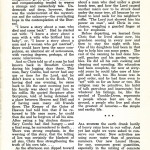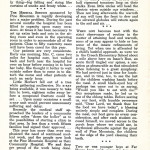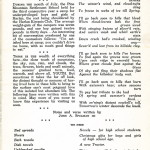Pine Mountain Settlement School
Series 17: PUBLICATIONS PMSS
NOTES 1940
October
NOTES – 1940
“Notes from the Pine Mountain Settlement School”
October
GALLERY
Thirty cents will feed a student for one day. Ten dollars will feed a student for one month.
- NOTES – 1940 October, page 1. [PMSS_notes_1940_oct_001.jpg]
- NOTES – 1940 October, page 2. [[PMSS_notes_1940_oct_002.jpg]
- NOTES – 1940 October, page 3. [[PMSS_notes_1940_oct_003.jpg]
- NOTES – 1940 October, page 4. [PMSS_notes_1940_oct_004.jpg]
TAGS: NOTES – 1940 OCTOBER: Chris Anderson, Tumble-Down, story-telling, dentist, Middle Fork, Breathitt County, religion, nature, camps, Harlan Kiwanis Club, youth, medical service, Sary Combs, Little Herbert, John A. Spelman, III, poetry
TRANSCRIPTION: NOTES – 1940 October
P. 1
NOTES FROM THE
PINE MOUNTAIN
SETTLEMENT SCHOOL
PINE MOUNTAIN * HARLAN COUNTY * KENTUCKY
Copyright, 1940, by Pine Mountain Settlement School, Inc.
Volume XIII OCTOBER, 1940 Number I
FOR ABOUT twenty years Chris Anderson lived as a tenant in a three room cabin just below the School’s mine on Greasy Creek. Previous to his residence near us, he had been a logger down in Breathitt County on the Middle Fork of the Kentucky River. He is a man of imagination. We knew this, so decided to him a visit the other day. Chris’ new house is a box-frame shack of two rooms, the vertical boards, after just two years, beginning to weather a soft gold. . . . A hot sun blinded us as we took the road west towards the Divide. As we passed Tumble-Down, the house now barely shouldering its members above tall and intertangled briars, there returned to mind this thought which came to us three years ago when first we were impressed by its simple dignity: “…. a symbol of the change, the kind of civilization the coal camp worked upon this widespread hill country and its people. . . . Yet the chimney stands, as do other chimneys of houses raked by fire — a sentinel of solidarity and a lasting monument of a people’s art wrought of stone”. Even now the chimney stands, not only as a symbol of beauty, but as a reminder of a way of life whose spirit was founded deep in the dignity of labor. . . .
There was the ring of Chris’ ax as we approached, but as soon as he saw us, we were welcomed into the yard and given chairs on his front porch. Through the opened front door we could see a room glowing in cleanliness, the double bed well made and neat. There was no difficulty in getting Chris to talk. Leaning back in his hickory-bottomed chair, he stroked his wrinkled face, swatted at flies, inspected hairs on his bared wrist. His profile cut a pattern as one carved from curly maple, amber and rugged. Eyes pointed toward the quick, steep rise of the hill across the road, but unseeing; he was remembering for us: “A man’s mind gets bad when he goes to gettin’ old. He don’t remember things like he used to. . . .”
What were the things he could not remember? How deep and with what sincerity was his laugh, which like a pulled curtain wrinkled his face in a broad grin? Had the autumn of his life withered his faculties, causing early pictures of childhood to fade? Had the meaning of his manhood disintegrated after his years of faithfulness to the sickly woman he had chosen to cleave unto till death? Or had the continuous and inevitable cycle of birth, marriage, and dying become such stark realism to him that each was dependent upon the other in the fabric of its function, with death now embodying the one great mystery outside his experience? For, although in Chris’ early married years, there had been the loss of babies, and…
P. 2
…later the loss of his wife, whom he had buried two years ago, here was his personal reflection of the force to which all men must submit. . . Hard work, even at his age, and sleep helped to bridge, at least temporarily, this contemplation and that of the eternal. Imagination given play by relaxation and companionship tended to weave a strange and melancholy tale. Underneath and deep, however, there was the undercurrent of the mysterious and the unknown — the everlasting hope in the contemplation of the Eternal.
“I know a story about a man who died and come back”. Had he started out with: “I know a story about a man with a wife who birthed him a baby”, or, “I know a story about a man and a woman who got married”, there would have been the same compulsion, an identical air of seriousness, with varying degrees, perhaps, of the comic interwoven.
And so Chris told us of a man he had known back in Breathitt County during his logging days there. This man, Sary Combs, had never had any use or time for the Lord, and he didn’t know a word in the Book. Yet, having died one evening, he came back to life the next morning just as his family was about to put him in his coffin. He quoted Scripture after Scripture, told of being detained in a place between Heaven and Hell and of having seen many old friends there. The Keeper of the Gates of Heaven had told him that if he returned to life once more, he could then die and be forgiven of all his sins. After eating a big chicken dinner — Sary Combs had died hungry — and a final song, he surrendered to death. . . . There was strong emphasis, in the weaving of this story, that the telling of lies was certainly the blackest of all sins, Chris thus strengthening the truth of his own tale. . . .
As the afternoon sun dipped toward the ruffled ridge-tops, the shadows lengthened, edging deep and dark into the valley. A cowbell echoed from some upper place, and the bees in the lovely velvet-red dahlias above us on the slope droned more quietly. . . . Chris continued with a superstitious tale of a woman who was haunted by her dead husband on the anniversaries of each of her nine daughters. She had borne him no sons, and, consequently, she was made to suffer this reminder for her past failings. . . . The last story was one about a man who died under a great beech tree, and how the Lord caused another man’s cow to be struck dead under the same tree, all because he refused to lend nails for his neighbor’s coffin. “The Lord just showed him his power on man”, said Chris in conclusion, waggling a gnarled finger at us for emphasis.
Before departing, we learned from Chris that he lived alone now, his grandson coming in every now and then to stay the night with him. One of his daughters had been in that day to help him can some pears. The rest of the canning he had done himself, peaches and his garden vegetables. He did all his own cooking and cleaning and mending. His education had been complete, for now at sixty-odd years he could take care of himself and well, too. His house was in good order, and he had time even to “set” with us for an hour or two. His religion may be primitive, his habit of talk garrulous and inaccurate; but whatever his failings, he, like the symbol of Tumble-Down, represents a people whose feet are on the ground, a people who live and share the greatest of luxuries — the simple and earthy life.
* * *
ALL SUMMER the earth drank lustily of heavy rains here in our valley. And yet last night we were asked to conserve our water. New activities are using more water than of previous summers. Our new Laurel House, for one, consumes great quantities, especially in the mixing of concrete for the first and second floors. A State Board of Health trailer is parked across from the Creech fountain, where its two dentists are serving as many as twenty-five children a day. Our summer building program has…
P. 3
…increased the number of bathrooms and showers. . . . . About bedtime, thunder announced the rain which continued through the night and half of today. There was the damp reminder of fall in the air and wisps of fog sifted through the trees high up near the ridge-top. . . . . A strange and lovely thing — fog falling and rising like curtains of smoke and frosty white. . . . .
* * *
THE MEDICAL SERVICE Sponsored by Pine Mountain is rapidly developing into a major problem. During the past several months the hospital has been filled to capacity upon many occasions. At times it has been necessary to set up extra beds and cots in the sit- ting room and even in the operating room in order to [accommodate] all of the patients. Close to fifty maternity cases will have been cared for this year.
Our patients are very considerate. Early one morning, Mrs. C. came two miles for hospital care, but walked back and forth near the hospital for over an hour before coming in to have her baby. She thought it better to wait outside rather than to come in to disturb the nurse and other patients at such an early hour.
Little Herbert fell out of a tree while gathering mulberries. No X-RAY being available, it was [necessary] to take him to town, eighteen miles away before a compound fracture could be set. . . . Upon many occasions a small X-RAY unit would prevent unnecessary suffering and delay.
Recently the medical staff approached the leaders of a community fifteen miles “down the holler” as to the possibilities of starting a clinic in that area. In less than a week fifteen families had signed their approval. . . .
This year has more than ever emphasized the need of continued medical work, and the people now look at the Pine Mountain Hospital as their Community Hospital. We and they are proud of the work being done. During the ensuing year our desire and their hope is that we may have facilities so adequate that almost every medical and surgical situation can be handled with ease.
* * *
LIKE A GREAT veil, the fog ascends in shimmering smoothness to a full moon tonight. There are no clear-cut shadows, only the blending darks of mountain and [flattened] tree shapes, points of moonlight reflecting from the gathering dew. . . . In the morning there will be heavy frost, no doubt, with half [ripened] tomatoes limp on their stalks. Even little icicles will bead the electric wires outside our windows. . . . Then not long afterwards the warmth of sun will turn the frost to dew and the silvered globules will return again to the soil and air. . . .
* * *
WHEN LIFE becomes taut with the strict observance of routine in the matter of attaining food and warmth, some of us may appear to hide or lose some of the innate refinements of living. Yet when one is affronted by a child’s bashful approach, as were we in the Creech Elementary School about a mile above here on Isaac’s Run, an acute thrill tingled our spines, a sensation as pleasurable as that stimulated when listening to a great symphony. We had arrived just in time for luncheon, and in time, too, to see the last of the children washing hands before the meal. A small black-eyed boy of perhaps ten came out to us saying, “Would you like to eat with me?” Our acceptance made, he led us to one of the oblong tables. Before seating us, our host, with humble reverence said, “Dear Lord, we thank thee for the food we have today”, a blessing entirely simple and complete. During the meal, our host gave us every consideration, and after each student excused himself, we moved across to the porch from where we could see, in rhythmical silhouette against the great wall of Pine Mountain, the children at the edge of the yard cleaning their teeth.
* * *
TWO OF THE younger boys at Far House have made room for two new students by moving out onto the lawn to sleep in a tent. Theirs is the sheer joy of camping these crisp autumn mornings.
* * *
P. 4
Coming to us twice before he was accepted, one of our new boys walked many miles from far back in the hills. He wanted a special kind of training at Pine Mountain, his first words being, “Can’t you scrouge me in on a workship?”
* * *
DURING THE month of July, the Pine Mountain Settlement School held for the third consecutive year a camp for underprivileged boys and girls of Harlan, the cost being shouldered by the Harlan Kiwanis Club. The average weight-gain of the campers was seven pounds, and one boy gained twelve pounds in thirty days. . . . An interesting bit of conversation overheard by one of the counselors follows: “I’m satisfied here at camp; you couldn’t drive me home, with so much good things to eat.”
* * *
THERE IS THE wealth of everything here — the close touch of mountains, the sky, sun, rain, and clouds, the trees, flowers, birds and small animals, the seasons’ gradual turn, food, warmth, and above all, YOUTH. But sometimes it takes the far off look, the distant thought or memory of having lived here in these hills to bring to the surface one’s most poignant love of this isolated but abundant life. The following lines were written with this in mind. May more of you come to know this experience by visiting us soon.
THE SEASON’S TURN
I’ll go back soon to hills I’ve known
Where skyline is not straight, but grown
In rugged, ruffled, rising peaks
Of stone and trees and earth. Where shrieks
The winter’s wind, and cloud-tufts cling
To freeze in webs of ice till Spring.
I’ll go back soon to hills that bleed
When cloud-bursts lash the first grown weed
With stinging knives of silver’d rain,
And waters wash and whirl earth’s stain.
Down creek bed’s crooked, winding way —
Sever’d and lost from its hillside clay.
I’ll go back soon to hills I’ve known
To find again the greens now grown
Upon each ridge in emerald hues;
Where great clouds float against the blues
Of sky and fling their shadows flat
Against the hillsides’ leafy mat.
I’ll go back soon to hills that burn
With autumn’s haze; when seasons turn
To pay last tribute to the bud
Of spring and summer’s verdant flood. . . .
With ev’ning’s distant cowbell’s toll,
Tomorrow’s winter descends the knoll.
Notes and verse written by
JOHN A. SPELMAN III
* * *
WE NEED
Bed spreads
Sheets
Bath towels
Dish towels
Unbleached muslin
Two Typewriters
Magazine subscriptions
Subscription to a good newspaper.
Novels — for high school students.
Christmas gifts for boys and girls of high school age.
A new Tractor.
Thirty cents will feed a student for one day.
Ten dollars will feed a student for one month.
* * *
Previous:
NOTES – 1939
Next:
NOTES – 1941
See Also:
ALICE COBB STORIES Chris Anderson and Josiah Combs…
MEDICAL
MEDICAL Guide
Return To:
NOTES Index





